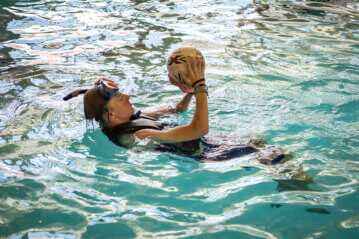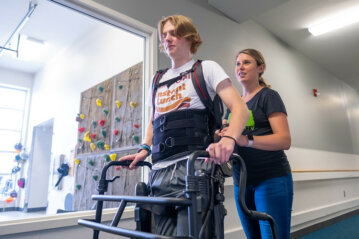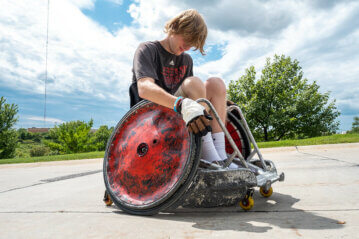Marty Ewing understands the details in perfection.
As a star pitcher for Indiana University South Bend, Marty spent a lifetime on the mound getting the details perfect. Keeping his wrist loose but not slack. Pressing the pad of his ring finger in the right place between ball stitches. Moving his body in one single, fluid gesture.
That attention to detail meant control. It meant he could tell his fingers where to go, his arms how to move, his feet the proper place to dig into the clay.
Then came an imperfect moment.
After a winning double-header, Marty and his teammates celebrated at an off-campus house party. There, uninvited guests arrived with the hopes of forcing their way in. The group threatened violence and, ultimately, opened fire at the house from the street.
One bullet found its way through the spinal cord of Marty, the gifted athlete, the all-American kid next door.
Marty lay for weeks in a hospital bed at Chicago’s Shirley Ryan AbilityLab, paralyzed from the shoulders down. Control was only a distant memory. By the time he started rehabilitation at QLI, three months after the bullet struck his spinal cord, 50 pounds of muscle had sloughed off his frame. It took his confidence with it. His attention to detail served as both a curse and constant reminder.
“Every time I saw myself, I saw a half-self,” Marty says. “Even less than.”
A comeback takes many forms — equal parts emotional as physical. Marty’s healing process began with a million individual details.
At QLI, his attention to detail became an asset. His therapists became coaches. He locked his focus on the movement patterns, exercises and repetition required to rebuild a functional skillset. His body responded in kind — quickly, he became stronger, more capable and more independent.
And, when he was ready, he was introduced to one of QLI’s most unique programs: adaptive sports.
Weaving Marty’s burgeoning physical abilities to his lifelong passion for competition, Adaptive Sports Specialist Jack Mahaffey unleashed the young athlete’s deep reserve of energy, confidence and potential. Marty found himself entrenched in training but couldn’t resist the appeal of wheelchair rugby—a bruising, rugged, physically intensive sport.
Marty thrived.
“He’s just a different beast,” Jack says. “He’s the kind of guy who’s scientific about the way he can get better with every repetition. He tweaks little movements. Improves efficiency. Even when he’s exhausted, he doesn’t stop.”
Suddenly, just as the path to recovery had taken many forms, so did the results. Physical victories materialized in the wake of his newfound emotional strength. With therapists, he coined a catchphrase — “Full send!” It encapsulated his all-or-nothing bravado and punctuated his ever-growing list of personal achievements.

There was no half-send and no more half-self. Marty refused to see challenges. Only opportunities.
“How does a person live a life they love while still working on the skills they need?” Marty asks. “The answer is the culmination of everything I’ve gone through, good and bad.”
Now, once again living in Indiana, Marty talks about life after injury, not with burden or resentment, but with great pride. The 20-year-old plans a return to college to begin a career in healthcare. And his competitive spirit enjoys new life — in late 2019, Marty went pro, as he calls it, joining the Chicago Bears Wheelchair Rugby team as a rostered player.
Marty embodies change and defines resurgence. But for him, the details still speak loudest of all.
“There’s one thing I’ve realized through this,” he says with a knowing, confident smile.
“The legs don’t make the man.”
Categories: Adaptive Sports, GRIT Adaptive Functional Fitness, Neuroplasticity, QLI Magazine, Spinal Cord Injury


